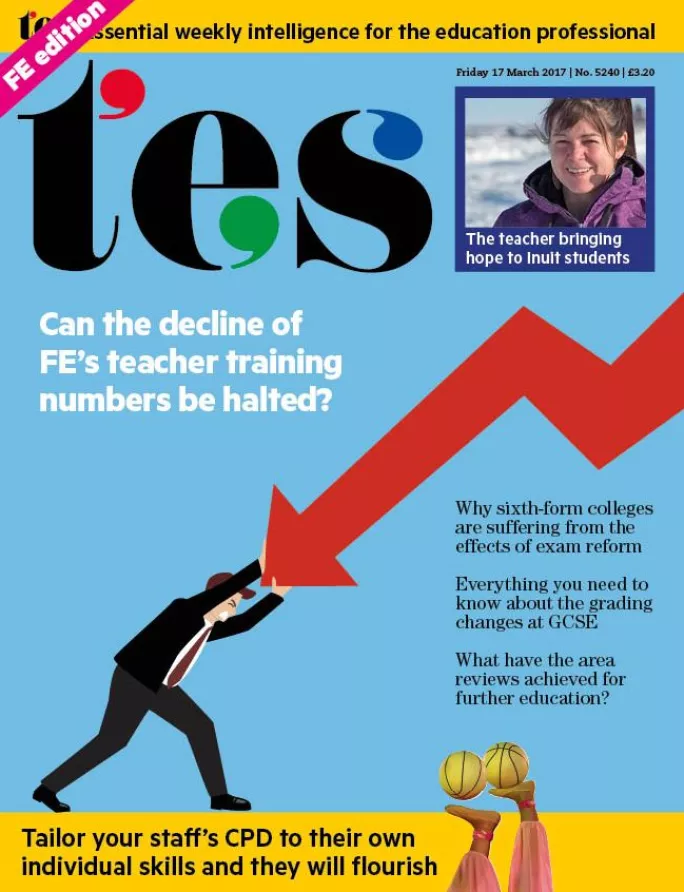- Home
- In this week’s TES Further: The unintended consequences of exam reform
In this week’s TES Further: The unintended consequences of exam reform

Reform, reform, reform
In this week’s TES Further, Bill Watkin, chief executive of the Sixth-Form Colleges’ Association, writes that there are some unintended consequences of the “tsunami of changes” to the exam system (article free for subscribers). Early indications suggest that students find the new English and maths GCSEs less appealing and enjoyable than the old ones, Watkin says, and in recent post-16 open evenings Year 11 students said that they would not choose A levels in maths or English as a result. Meanwhile, the decoupling of AS and A level, combined with low funding levels, means that sixth-form providers are starting to offer fewer subjects (three, rather than four) from the outset. “In a time of great change, it is only in the implementation phase that unintended consequences stat to emerge,” Watkin writes. “We need to remain fleet-footed and flexible in order to ensure the effective implementation of the changes for all.”
Exclusive: FE teacher training falls by a fifth
TES reporter Julia Belgutay reveals that the teacher training total for the sector has dropped by over a fifth in a year. According to a report by the Education and Training Foundation, shared exclusively with TES, there has been a 22 per cent decrease in the number of learners studying initial teacher education courses for FE between 2013-14 and 2014-15.
FE editor Stephen Exley writes that although there is an all-but-universal acceptance of the deeply troubling scale of the teacher recruitment crisis, there appears to be significantly less understanding of how the issue affects FE. “If there’s a teacher recruitment crisis in schools, what on earth does that say about the situation in FE?” he writes. “With political capital invested in the new T levels, this is a situation the government can ill afford to ignore.”
So what is technical education?
Martin Doel, the Further Education Trust for Leadership professor of leadership in FE and skills at the UCL Institute of Education, gets all technical and asks how technical education differs from academic education (article free for subscribers). A lot of attention has been given to technical education and skills in the government’s industrial strategy Green Paper, he writes. In it, the term “technical education” appears more than 30 times over 10 pages. But what is technical education - is it simply a rebadging of vocational education, or something entirely different? “Unless we begin to think more deeply about such distinctions,” Doel writes, “the current concentration on technical education might prove to be just another rebranding exercise.”
A*=9
Mark Chutter, an English and drama specialist, writes that staff across the country are concerned about the reliability and accuracy of the grade boundaries for GCSE this summer, with the new 9 to 1 grades replacing the old A* to G ones (article free for subscribers). While explaining how the new grades will work (at least in theory), Chutter cautions against direct comparisons and overly simplistic descriptions of the new approach. “This summer will be revelatory to staff and students,” he writes. “We wait with baited breath for the most significant change in grading since GCSE examinations were introduced in 1988.”
Reviewing the reviews
Andy Forbes, principal of the College of Haringey, Enfield and North-East London, attempts to review the area reviews. The highly publicised process, he believes, “has damaged the reputation of the FE sector”. Ultimately, colleges’ struggles are down to “three Cs” - costs, cuts and competition, he says. And though the area review process may have given failed colleges the chance of a decent burial, “the gravediggers will be back again soon unless the three Cs that caused the crisis are addressed”.
FErret
FErret welcomes to the wonderful world of FE Ofsted’s new chief inspector, Amanda Spielman, who today gave her first major set-piece speech to an FE audience at the Association of Colleges’ Ofsted conference in London (article free for subscribers). In her speech Ms Spielman stressed that she wanted to “reset” the inspectorate’s relationship with the sector, and vowed not to make “unevidenced claims” about it (a reference, perhaps, to her rather outspoken predecessor Sir Michael Wilshaw). So FErret looks forward to what Ms Spielman has to say about the sector in the future. “Amanda,” he writes, “whatever nasty things those frightful bullies at the Commons Education Select Committee may have said about you, FErret’s not having it.”
All this and much, much more in this week’s TES Further.

Want to keep up with the latest education news and opinion? Follow TES FE News on Twitter, like us on Facebook and follow us on LinkedIn
Keep reading for just £1 per month
You've reached your limit of free articles this month. Subscribe for £1 per month for three months and get:
- Unlimited access to all Tes magazine content
- Exclusive subscriber-only stories
- Award-winning email newsletters



